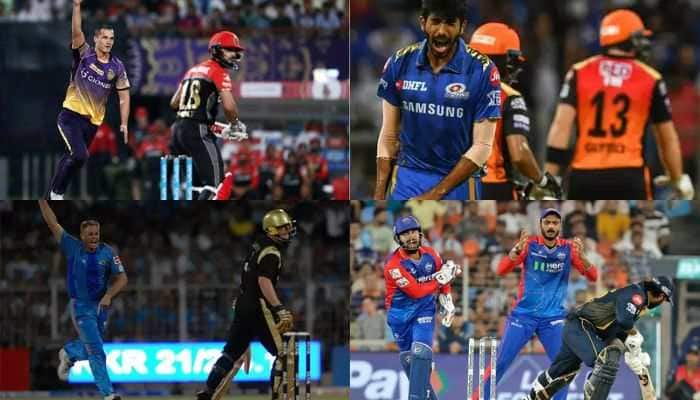Should India talk to Pakistan?
The love-hate relationship that India shares with Pakistan hit an all time low after the devastating 26/11 Mumbai terror strike.
Trending Photos
)
 Sharique N Siddiquie
The love-hate relationship that India shares with Pakistan hit an all time low after the devastating 26/11 Mumbai terror strike. Since then, the relation between the two countries has been more or less caught in a logjam for close to one and a half years now.
Recently, when India declared starting of dialogue with Pakistan, it came as a sigh of relief for the world at large as well as for scores of peaceniks as harmony between the two nations is essential for peace in the South-Asian region.
But the inevitable happened again. Amidst reports of top terrorists meeting in PoK to declare a major offensive against India and the Pakistan al-Qaeda openly threatening the sports events scheduled here this year, terror struck a German bakery in Pune, leaving 15 dead and the familiar anger pangs erupted.
The blasts left the proposed talks in jeopardy. The old disturbing question returned to haunt us again: Should India talk to Pakistan at all? After all, in spite of sustained efforts by India to resolve all bilateral issues peacefully, Pakistan has failed to relinquish its terror centric foreign policy.The History
Ever since its creation in 1947, after the partition of India, Pakistan has shared see-saw relations with us. Initially there was a lot of bloodshed in the communal riots that followed Partition and then the insurgency in Kashmir of 1948 led to the first Indo-Pak war.
In the subsequent years, Kashmir became the main issue of conflict between the two countries with Pakistan launching another offensive against India in 1965 to capture the state, only to be defeated by India.
In 1971, the uprising in East Pakistan further destroyed the ties between the two countries. Indira Gandhi’s decision to support the rebellious Bengali populace, led to a brief but bloody war, resulting in the creation of Bangladesh.
Following the war, in July 1972, Indira Gandhi and Pakistani President Zulfikar Ali Bhutto signed the Shimla Agreement, according to which India would return all Pakistani personnel (over 90,000 surrendered) and captured territory in the west, and the two countries would "settle their differences by peaceful means through bilateral negotiations".
Years later in 1999, Atal Bihari Vajpayee tried to rebuild the relations and went to Pakistan for talks in a bus to Lahore. The Delhi-Lahore bus service was thus started with this visit and hopes of India-Pakistan reconciliation were in the air. That was followed by the Kargil war which led to the spectre of a nuclear war.
In 2000, Vajpayee again took the initiative and called the architect of the above war and now a dictator, Pakistan’s President General Pervez Musharraf to Agra- the city of the love monument of Taj Mahal- for talks. Nothing much was achieved, as both sides could not agree over the wordings of the final draft of the meeting.
In 2004, the two counties established a composite dialogue process that promised a systematic discussion of all outstanding issues between the two countries on levels ranging from that of the Foreign Secretaries to the PMs. An anti-terror mechanism was also set up by the two sides, but it failed miserably, what with the Mumbai terror attacks topping all other acts of terror against India.
Ironically the last round of talks, which was the fifth one, was between the Home Secretaries of both countries, was held on November 26 in 2008- the day the Mumbai attacks began.
As always, the terrorists were of Pakistani origin and later investigations revealed that the conspiracy was also hatched on Pakistani soil. India was stunned and the relations between the two countries came to a standstill. The issues
As India and Pakistan go for secretary level talks on February 25, there will be a lot of issues that are bound to be discussed with terror undoubtedly topping the chart and Pakistan continuing to harp on Kashmir.
Another critical issue that will come up will be the 26/11 probe. This will include the questioning of actions taken by the Pakistan government against perpetrators of the crime who are still hiding in that country.
Also among the main list of issues will be other Indian criminals that are hiding in Pakistan including most wanted Dawood Ibrahim and his D-company members. The continuing policy of Pakistan to support terrorism in India and it being a safe haven for almost all the most wanted fugitives will also be brought to the table.
Bilateral trade relations, cricketing ties (the IPL episode), terrorist threat posed by al-Qaeda and the turmoil in Afghanistan would also come up, though Pakistan wouldn’t want to include the Afghan crisis in these talks. It will try to push Balochistan, though.Possible solutions
Before moving on to the possible outcomes of the talks, we must return to the original question that whether India should talk to Pakistan in the first place; after all, every effort that India puts in to normalise relations has always been negated by one thing or the other from Pakistan’s side.
Looking at the history of ties between the two countries, the dialogue seems futile and both countries end up on square one after some or the other incident that leaves a bad taste.
But there is another question: Can India not talk to Pakistan and remain in peace and prosperity mode? This is a very tricky question, but the answer will be no. India being a mature and sensible country, with non-violent leanings and world power dreams, should make an effort to resolve all issues amicably. That it re-started the process is enough indicator towards this larger sense prevailing in the current government.
Even though very little is expected out of these talks which may also see Home Minister P Chidambaram visit Pakistan, the efforts are worth an applause. India seems to be seriously contemplating a positive outcome and expects to carry it forward to a Minister level.
It remains to be seen whether these talks would bring some fruitful results or will they follow in the tradition of other failed attempts at peace. It is a start for sure and one can only keep their expectations on the lower side and fingers crossed to prevent a break of heart.
Sharique N Siddiquie
The love-hate relationship that India shares with Pakistan hit an all time low after the devastating 26/11 Mumbai terror strike. Since then, the relation between the two countries has been more or less caught in a logjam for close to one and a half years now.
Recently, when India declared starting of dialogue with Pakistan, it came as a sigh of relief for the world at large as well as for scores of peaceniks as harmony between the two nations is essential for peace in the South-Asian region.
But the inevitable happened again. Amidst reports of top terrorists meeting in PoK to declare a major offensive against India and the Pakistan al-Qaeda openly threatening the sports events scheduled here this year, terror struck a German bakery in Pune, leaving 15 dead and the familiar anger pangs erupted.
The blasts left the proposed talks in jeopardy. The old disturbing question returned to haunt us again: Should India talk to Pakistan at all? After all, in spite of sustained efforts by India to resolve all bilateral issues peacefully, Pakistan has failed to relinquish its terror centric foreign policy.The History
Ever since its creation in 1947, after the partition of India, Pakistan has shared see-saw relations with us. Initially there was a lot of bloodshed in the communal riots that followed Partition and then the insurgency in Kashmir of 1948 led to the first Indo-Pak war.
In the subsequent years, Kashmir became the main issue of conflict between the two countries with Pakistan launching another offensive against India in 1965 to capture the state, only to be defeated by India.
In 1971, the uprising in East Pakistan further destroyed the ties between the two countries. Indira Gandhi’s decision to support the rebellious Bengali populace, led to a brief but bloody war, resulting in the creation of Bangladesh.
Following the war, in July 1972, Indira Gandhi and Pakistani President Zulfikar Ali Bhutto signed the Shimla Agreement, according to which India would return all Pakistani personnel (over 90,000 surrendered) and captured territory in the west, and the two countries would "settle their differences by peaceful means through bilateral negotiations".
Years later in 1999, Atal Bihari Vajpayee tried to rebuild the relations and went to Pakistan for talks in a bus to Lahore. The Delhi-Lahore bus service was thus started with this visit and hopes of India-Pakistan reconciliation were in the air. That was followed by the Kargil war which led to the spectre of a nuclear war.
In 2000, Vajpayee again took the initiative and called the architect of the above war and now a dictator, Pakistan’s President General Pervez Musharraf to Agra- the city of the love monument of Taj Mahal- for talks. Nothing much was achieved, as both sides could not agree over the wordings of the final draft of the meeting.
In 2004, the two counties established a composite dialogue process that promised a systematic discussion of all outstanding issues between the two countries on levels ranging from that of the Foreign Secretaries to the PMs. An anti-terror mechanism was also set up by the two sides, but it failed miserably, what with the Mumbai terror attacks topping all other acts of terror against India.
Ironically the last round of talks, which was the fifth one, was between the Home Secretaries of both countries, was held on November 26 in 2008- the day the Mumbai attacks began.
As always, the terrorists were of Pakistani origin and later investigations revealed that the conspiracy was also hatched on Pakistani soil. India was stunned and the relations between the two countries came to a standstill. The issues
As India and Pakistan go for secretary level talks on February 25, there will be a lot of issues that are bound to be discussed with terror undoubtedly topping the chart and Pakistan continuing to harp on Kashmir.
Another critical issue that will come up will be the 26/11 probe. This will include the questioning of actions taken by the Pakistan government against perpetrators of the crime who are still hiding in that country.
Also among the main list of issues will be other Indian criminals that are hiding in Pakistan including most wanted Dawood Ibrahim and his D-company members. The continuing policy of Pakistan to support terrorism in India and it being a safe haven for almost all the most wanted fugitives will also be brought to the table.
Bilateral trade relations, cricketing ties (the IPL episode), terrorist threat posed by al-Qaeda and the turmoil in Afghanistan would also come up, though Pakistan wouldn’t want to include the Afghan crisis in these talks. It will try to push Balochistan, though.Possible solutions
Before moving on to the possible outcomes of the talks, we must return to the original question that whether India should talk to Pakistan in the first place; after all, every effort that India puts in to normalise relations has always been negated by one thing or the other from Pakistan’s side.
Looking at the history of ties between the two countries, the dialogue seems futile and both countries end up on square one after some or the other incident that leaves a bad taste.
But there is another question: Can India not talk to Pakistan and remain in peace and prosperity mode? This is a very tricky question, but the answer will be no. India being a mature and sensible country, with non-violent leanings and world power dreams, should make an effort to resolve all issues amicably. That it re-started the process is enough indicator towards this larger sense prevailing in the current government.
Even though very little is expected out of these talks which may also see Home Minister P Chidambaram visit Pakistan, the efforts are worth an applause. India seems to be seriously contemplating a positive outcome and expects to carry it forward to a Minister level.
It remains to be seen whether these talks would bring some fruitful results or will they follow in the tradition of other failed attempts at peace. It is a start for sure and one can only keep their expectations on the lower side and fingers crossed to prevent a break of heart.






)
)
)
)
)
)
)
)
)
)
